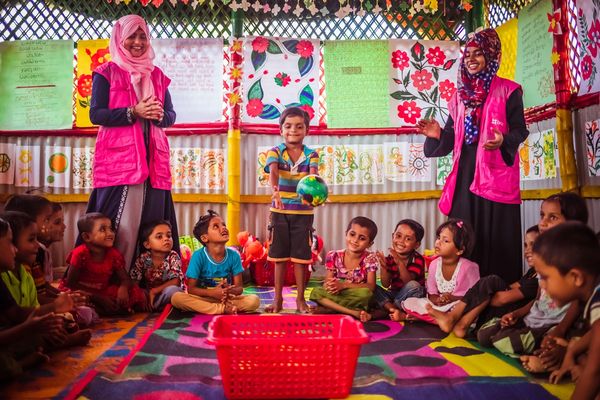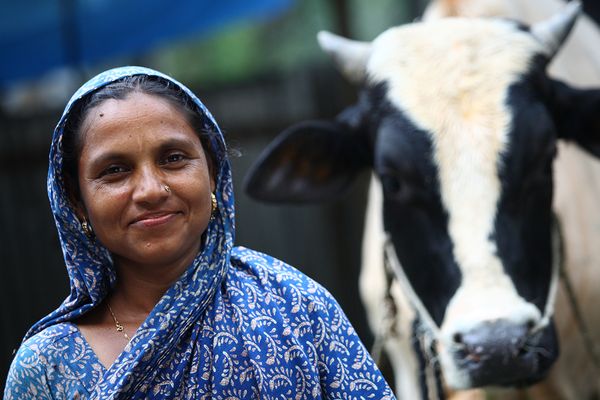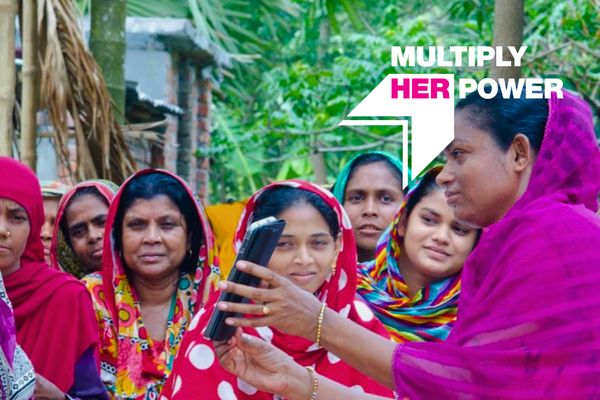
In 2017, hundreds of thousands of Rohingya people fled to Cox’s Bazar, Bangladesh, escaping violence in Myanmar. More than 50% of them were young children who had witnessed unimaginable horrors. Nearly a million refugees now shelter in the region, including 500,000 children. These children, many under the age of six, faced not only the trauma of displacement but also the risk of losing out on critical early learning experiences.
In the face of such overwhelming challenges, how do we ensure that these children have a chance to thrive? BRAC’s Humanitarian Play Lab model offers an answer — through the simple yet profound power of play.
What are Humanitarian Play Labs?
BRAC’s Humanitarian Play Labs are safe spaces where children aged zero to five can learn, heal, and grow through play. Co-created in the Rohingya community of Cox’s Bazar, Bangladesh, in partnership with the local communities, Humanitarian Play Labs are designed to meet the unique needs of children in crisis contexts, offering early childhood development, psychosocial support, and cultural preservation.
The model operates on two levels: a home-based model for children aged zero to three and their caregivers, and a center-based model for children aged three to five. In both settings, play is the central medium through which children develop cognitive, social, and emotional skills.
At the heart of Humanitarian Play Labs are the Play Leaders — young women from the Rohingya community who are trained in play-based learning and psychosocial support. Play Leaders facilitate culturally relevant activities and serve as role models and mentors within their communities. By leading sessions that incorporate traditional Rohingya songs, stories, and games, they help children maintain a connection to their heritage while fostering resilience and adaptability.
Humanitarian Play Labs also feature deep community engagement. Caregivers and other community members are actively involved in the program, attending sessions, participating in parenting workshops, and helping to create low-cost, recycled play materials. This collaborative approach ensures that the benefits of the program extend beyond the children to their families and the wider community.
Play matters: Especially in humanitarian settings
The importance of play in early childhood development is well-documented, but its significance is even greater in humanitarian settings. Research shows that children who experience prolonged toxic stress — such as the stress caused by displacement — are at risk of lasting harm to their brain development, leading to lifelong challenges in learning, behavior, and mental health.
Play offers a powerful antidote to this toxic stress. It stimulates brain development, enhances social-emotional skills, and provides a sense of normalcy and safety. BRAC’s Play Labs in Bangladesh have proven to improve children’s developmental outcomes, reduce gaps between children’s outcomes, and equip parents with knowledge and resources to support their children’s development.
In the structured environment of a Humanitarian Play Lab, children can engage in activities that allow them to express themselves, build relationships, and develop the resilience they need to navigate their challenging circumstances.
The Humanitarian Play Lab model has shown promising results. Evaluations of the program in Cox’s Bazar have found significant improvements in children’s communication, problem-solving skills, and emotional well-being. Mothers who participated in the program reported better mental health, a greater sense of belonging, and increased involvement in their children’s development. And new research shows the program boosted children’s vocabulary, increased fathers’ parenting engagement, and reduced corporal punishment.
Humanitarian Play Labs have also been successfully adapted to other contexts, such as Uganda, where they are helping to meet the needs of both refugee and host community children. These results highlight the potential of the model to be scaled and adapted to other humanitarian contexts around the world.
Play for all!
As the refugee crisis in Cox’s Bazar persists and other crises continue to unfold around the globe, it is more important than ever to provide safe, supportive, and culturally relevant learning environments for the youngest victims of crisis and displacement.
More than that, it is critical to provide the transformative power of play.
BRAC’s Humanitarian Play Labs offer a clear path forward: placing play at the center of early childhood development and engaging entire communities in the process.
Every child deserves the chance to learn, heal, and grow, no matter where they are born or the challenges they face.
On this World Humanitarian Day, let us commit to supporting the youngest and most vulnerable among us through innovative, community-driven, and playful solutions. Together, we can help ensure that no child is left behind, even in the most difficult circumstances.
Learn more about BRAC’s humanitarian response in Cox’s Bazar, Bangladesh.
Dr. Erum Mariam is Executive Director of BRAC Institute of Educational Development.



